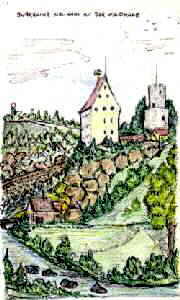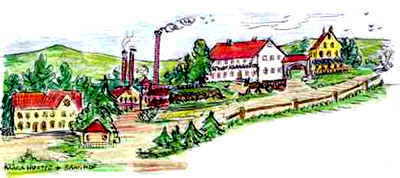At the turn of the
century, my parents' hometown was just a small country town on the banks
of the Naab River in northeastern Bavaria.
 Across the river on top of the
hill in the neighboring town, there stood the ruins of an old
fortress. These two towns were nestled among the rolling hills of the Oberpfalz
and were surrounded by farmland and the thick stands of the forests of
the Waldnaabtal.
Across the river on top of the
hill in the neighboring town, there stood the ruins of an old
fortress. These two towns were nestled among the rolling hills of the Oberpfalz
and were surrounded by farmland and the thick stands of the forests of
the Waldnaabtal.
Their town had been almost totally destroyed by fire in 1848 and was now, in the second half of the 19th century, mostly single-storied homes badly in need of repair. Life was hard. Most of the inhabitants were day laborers of various sorts and people engaged in cottage industries. This little town epitomized the slow awakening of country folk just beginning to experience the effects of an Industrial Revolution that had taken place many years earlier in other parts of Europe. |
